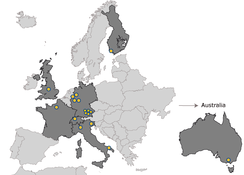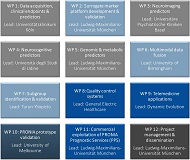 |
|
|
Prof. Paolo Brambilla, MD, PhDPrincipal Investigator Phone: +39 025503 2717 Skype: paolobram1 ResearcherID: B-4184-2010
|
Università degli Studi di MilanoVia Festa Del Perdono 7 20122 Milano Italy |
|
Prof. Carlo Altamura, MDProfessor and Chairman |
Mario Rango, MD, PhDNeurologist and Radiologist |
Adele Ferro, PsychD, PhDClinical Psychologist |
Marika Belleri, PsychDClinical Psychologist |
Eleonora Maggioni, PhDBioengineer |
Letizia Squarcina, PhDBioengineer |
Marta Re, PhDPhysical Engineer |
Giuseppe Delvecchio, PsychD, PhDNeuroscientist |
Anna Meneghelli, PsychDClinical psychologist |
Emiliano Monzani, MDPychiatrist |
Prof. Roberto Sassi, PhDBioengineer |
Maurizio Sberna, MDNeuroradiologist |
Luciana Gennari, BSMR Technician |
The mission of the University of Milan, established in 1924, is to contribute to society through the pursuit of teaching/education and research at the highest international levels of excellence. It is the only Italian member among the 21 prestigious Universities of the League of European Research Universities (LERU). With a teaching staff of about 2.200 tenured professors and with almost 60.000 students, the University of Milan is the largest university in Lombardy, one of the most dynamic and internationally-oriented EU regions.
PRONIA activities will be developed at the Pathophysiology and Transplantation Department. The Department hosts a multidisciplinary environment, where the knowledge sharing is strongly facilitated, particularly in the fields of patho-physiology, clinical sciences and innovative technologies aimed at Research, Teaching and Health activities.
Paolo Brambilla (PI, WP04 Leader) is Associate Professor in Psychiatry at UMIL and Adjunct Associate Professor of Psychiatry at the University of Texas Medical School in Houston, USA. At UMIL, Paolo Brambilla leads research programmes dedicated to the study of the pathophysiology of major psychoses. A variety of neuroimaging and cognitive techniques are used, employing structural, diffusion, spectroscopy, functional, and perfusion acquisitions integrated with genetic and cognitive investigations. Also, machine learning procedures, which are also used in PRONIA, are currently implemented for the neurodiagnosis of schizophrenia by Brambilla’s laboratory, which was one of the first international laboratories to apply such techniques to psychiatric imaging.
As per this project we will collaborate with the Programma 2000 at the Niguarda Ca’ Granda Hospital in Milan, which is the first and only established Italian early multidimensional intervention program for first-episode patients and ARMS individuals











